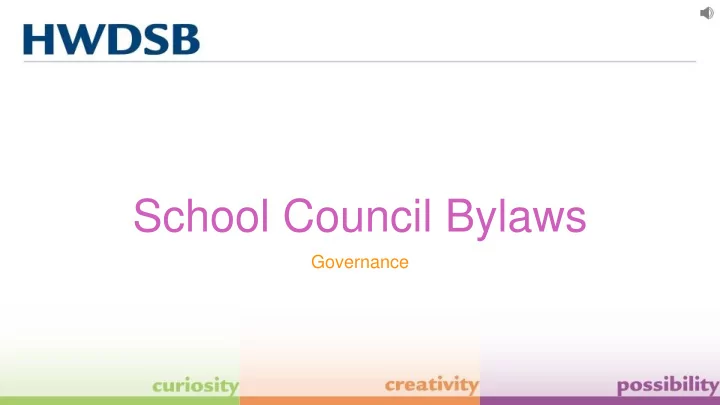

School Council Bylaws Governance
Learning Goals ☑ Understand bylaws and constitution ☑ Mandatory requirements under Regulation 612 and those you may wish to consider so that your council runs smoothly ☑ Understand how to develop bylaws & your constitution for school council (section 7 of School Council: A Guide for Members) ☑ Access Tips, samples and templates
What are Bylaws? • Rules that guide how your school council operates • Foundation for helping your council run smoothly and to stay on track
Ministry Requirements • School councils are not required to develop lengthy constitutions, since Ontario Regulation 612/00 sets out the mandate and roles and responsibilities for school councils. In effect, the regulation serves as the constitution for the school council • It is recommended that school councils develop certain bylaws to provide them with direction for the operation of council business and to help the council work effectively
Mandatory Bylaws • Ontario Regulation 612 states that school councils must have bylaws to address • election procedures • filling of vacancies • conflict of interest • conflict resolution procedures Reg. 612, s.15 (2)
Optional Bylaws • School Councils may also wish to develop bylaws related to the following: • A School Council Code of Ethics and/or Council Norms and Values • General expectations regarding meetings (e.g., attendance, promptness) • The number and schedule of meetings (at least 4 meetings must be held each school year) • The maximum number of parent members on the council and the number of members required for quorum
Optional Bylaws (continued) • School Councils may also wish to develop bylaws related to the following: • The number, description, and duties of executive officers (Chair, Vice Chair, etc.) • The establishment and role of committees • A process for seeking input from the community • A method for determining priorities for fundraising (if applicable) Ensure that bylaws created by the school council do not conflict with Reg. 612
• Your bylaws do not need to be updated annually but should be reviewed at the first meeting each year • Your bylaws also help new members understand how the council operates
• Make sure your bylaws are: • Simple, clear, and concise • Not overly restrictive or detailed • Written to reflect how your school council currently operates • Consistent with board and ministry policies Consider creating a bylaws sub- committee to help develop a list of bylaws that work for your school council.
• When determining the number of parents to comprise membership of your school council it is recommended that you consider the typical number of members in attendance at your meetings • Robert’s Rules state that “…the by -laws should provide for a quorum as large as can be depended upon for being present at all meetings when the weather is not exceptionally bad.”
• Don’t reinvent the wheel • Make use of other models and examples from other school councils • Take advantage of opportunities to network and share ideas with other school councils
• When establishing your bylaws for the conflict resolution process be sure to refer to the HWDSB ‘ Respectful Working and Learning Environments: Conflict Prevention and Resolution Directive’ document
School Council Handbook Ontario Regulation 612
Recommend
More recommend